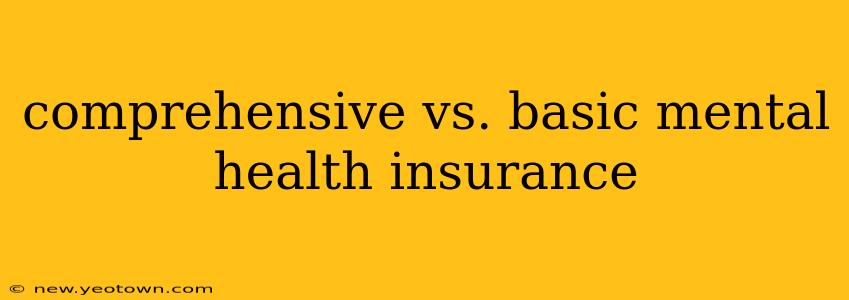Comprehensive vs. Basic Mental Health Insurance: Navigating the Maze of Coverage
Choosing the right mental health insurance can feel like navigating a labyrinth. The terms "comprehensive" and "basic" are often thrown around, leaving many feeling lost and confused. This isn't just about dollars and cents; it's about access to crucial care for your well-being. Let's unravel the differences and help you make an informed decision.
Imagine two paths diverging in a wood. One, a well-maintained highway offering a smooth, comprehensive journey. The other, a narrow, less-traveled dirt road, representing basic coverage. Which path best suits your needs?
This isn't a simple "one size fits all" situation. Your ideal plan depends on your individual circumstances, including your mental health history, anticipated needs, and financial capabilities. Let's delve deeper into the specifics.
What does "comprehensive" mental health insurance typically cover?
A comprehensive mental health insurance plan acts like a robust shield, offering broad protection against a wide array of mental health challenges. This typically includes:
- Extensive network of providers: Access to a larger pool of therapists, psychiatrists, and other mental health professionals. This means more choices and potentially a better fit for your needs and preferences.
- Higher coverage limits: Comprehensive plans often have higher annual or lifetime maximums for mental health services. This ensures you can receive the necessary treatment without hitting a financial ceiling too quickly.
- Wider range of services: Beyond therapy sessions, comprehensive plans may cover things like medication management, inpatient treatment, partial hospitalization programs (PHP), intensive outpatient programs (IOP), and even alternative therapies like acupuncture or yoga, if deemed clinically appropriate.
- Lower out-of-pocket costs: Expect lower co-pays, deductibles, and coinsurance compared to basic plans.
Think of it as a robust safety net, offering peace of mind knowing you have ample resources available to address your mental health needs without constant worry about the financial burden.
What are the limitations of basic mental health insurance?
Basic mental health insurance plans, on the other hand, often resemble that narrower, less-traveled path. While they offer some coverage, they typically come with more restrictions:
- Limited provider networks: You might have fewer choices when selecting a therapist or psychiatrist, potentially leading to longer wait times or a less suitable match.
- Lower coverage limits: Annual or lifetime maximums for mental healthcare might be significantly lower, meaning you could quickly exhaust your benefits.
- Restricted services: Basic plans may only cover a limited number of therapy sessions per year, exclude certain types of treatment (like inpatient care or specialized therapies), or require pre-authorization for almost every visit.
- Higher out-of-pocket expenses: You'll likely face higher co-pays, deductibles, and coinsurance, making treatment more financially burdensome.
Choosing a basic plan might seem financially attractive initially, but it could end up being more expensive in the long run if you need extensive care beyond the plan's limitations.
What are the key differences in coverage between the two?
The core difference lies in the extent of coverage and access to care. Comprehensive plans prioritize access to a wider range of services with fewer financial obstacles, while basic plans offer more limited coverage and potentially higher out-of-pocket costs. Consider this analogy: a comprehensive plan is like a fully stocked medical kit, whereas a basic plan is more like a small first-aid kit – enough for minor issues, but insufficient for serious needs.
How do I find out what my plan covers?
The details of your mental health coverage are often buried deep within your insurance policy’s Summary of Benefits and Coverage (SBC). It's a dense document, but don’t be intimidated! Look for sections explicitly detailing mental health benefits, including:
- Covered services: What specific types of mental health treatment are covered?
- Provider network: Is there a network of in-network providers? How can I access this network directory?
- Cost-sharing: What are your co-pays, deductibles, and coinsurance for mental health services?
- Annual and lifetime limits: Are there limits on how much the insurance will pay for mental health services annually or over your lifetime?
Don't hesitate to contact your insurance provider directly if you have any questions or need clarification about your coverage.
Choosing the right mental health insurance is a personal journey. It requires careful consideration of your individual needs and financial capabilities. By understanding the differences between comprehensive and basic plans, you can make a more informed decision and pave the way to accessing the care you deserve. Remember, prioritizing your mental health is an investment in your overall well-being.

